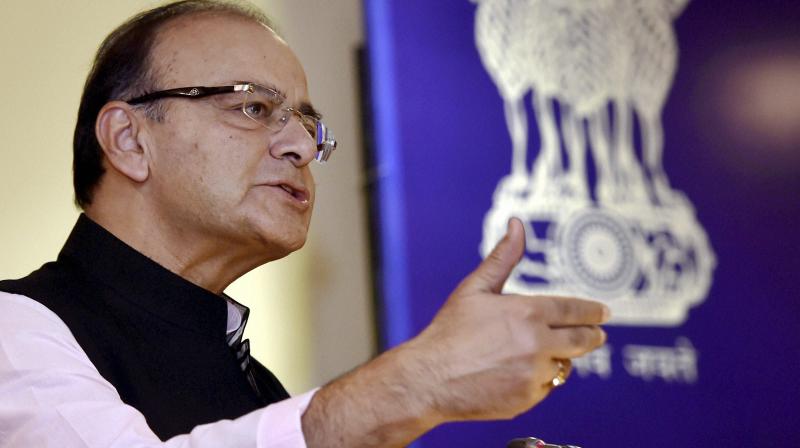Jaitley favours cess over additional tax to compensate loss of revenue on GST

New Delhi: Finance Minister Arun Jaitley on Wednesday favoured levy of cess on tobacco and luxury products to compensate states for loss of revenue on GST saying the cost of funding that through an additional tax would be "exorbitantly high and almost unbearable".
Ahead of the meeting of all powerful GST Council next week to decide on GST rates, Jaitley said the 4-slab structure of 6, 12, 18 and 26 per cent was under consideration, with lower rates for essential commodities and higher bracket for luxury goods.
"Different items used by different segments of society have to be taxed differently. Otherwise the GST would be regressive. Air conditioners and hawai chappals cannot be taxed at the same rate.
Total tax eventually collected has to be revenue neutral. The Government should not lose money necessary for expenditure nor make a windfall gain," he wrote in a Facebook post.
Explaining the rationale for cess, Jaitley said if the central government has to borrow money to fund states' compensation, it would add to its liability and increase cost of borrowing for the Centre, state governments and the private sector.
He said there is no rationale for increasing direct tax for this purpose and theoretically it has been argued that the compensation be funded out of an additional tax in the GST rather than by cess.
"Assuming that the compensation is Rs 50,000 crore for the first year, the total tax impact of funding the compensation through a tax would be abnormally high. A Rs 1.72 lakh crore of tax would have to be imposed for the Central Government to get Rs 50,000 crore in order to fund the compensation," he said.
"50 per cent of the tax collected would go to the States as their GST share and of the balance 50 per cent in the hands of the Central Government and 42 per cent more would go to the States as devolution.
"So out of every 100 rupees collected in GST only 29 per cent remains with the centre. The tax impact of this levy would be exorbitantly high and almost unbearable," he said.
Alternatively, Jaitley said cesses can be imposed which would be subsumed in the taxes after five years. "This would include clean energy cess and cesses on luxury items and tobacco products, which in any case, presently also pay levy higher than 26 per cent.
This would ensure no additional burden on the tax payer and yet be able to compensate the losing states," he said. Jaitley said if cess is levied, states which benefit out of GST roll out do not have to compensate the losing states.
"The Centre, as a non-beneficiary, has to compensate and the proposal for continuing existing cesses for five years to the extent of compensation required is the more benign way of compensating the losing states without burdening the tax payer," he said.
Jaitley said it has been proposed to the Council that there should be a 4-slab multi-rate tax structure with items constituting nearly 50 per cent of the weightage in the Consumer Price Index basket (mainly food items) being exempted from the levy. "There will be a zero tax on such items.
The object of this is to ensure that the GST structure is not regressive or burdensome on the common man," he said. In the GST Council meeting last week, some states had
expressed concern over the Centre's proposal to impose cess on demerit goods over and above the higher tax bracket of 26 per cent. A final decision on this is expected in the next meeting on November 3-4.
Jaitley further said that unlike developed countries, developing nations like India need more tax slabs as they have to take care of people below poverty line. "The reality is that a multiple tax rate in India is inevitable for several reasons... The tax on some products in a narrow slab regime will substantially increase.
This would be highly inflationary," he said. A commodity being taxed by the Centre and states at 11 per cent at present will be taxed at 12 per cent. If its taxation is suddenly raised on standard rate of 18 per cent, it would disrupt the market and would be highly inflationary.
Jaitley said presently there are several items mainly used by the more affluent which are taxed at a VAT of 14.5 per cent and an excise of 12.5 per cent. "If the cascading effect of these taxes and octroi is added, then range of taxation of these products is between 27-31 per cent.
It has been proposed to the Council to fix the rate of these items at 26 per cent. "Some of the items which are now being used by the lower middle classes will eventually be proposed to be shifted to the 18 per cent bracket.
With regard to demerit and luxury goods which are taxed globally at a higher rate, no rebates are contemplated. Each good would be taxed on the basis of its own demerit," he added.

